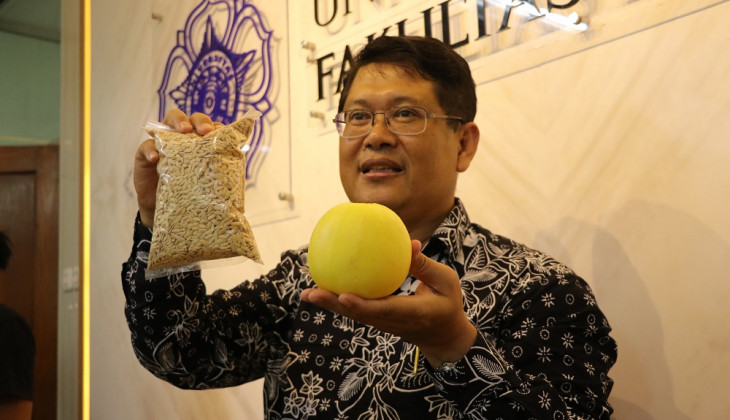Melon stands as one of Indonesia's favored fruits, known for its sweetness, high water content, and rich vitamin and mineral profile. However, the generally large and heavy size of melons can sometimes make them less convenient to carry or store. That led Prof Dr. Budi S. Daryono, M.Agr.Sc from the Faculty of Biology at Gadjah Mada University, to conduct research and develop a new cultivar of melon, which is as small as an apple. This mini melon was named Hikapel.
The story of Hikapel began with casual conversations among mothers from socialite groups in Yogyakarta and Jakarta. In 2011, these mothers were offered products from Budi Daryono's previous melon research, including Melodi Gama 1, 2, and 3, GMB melon, and Tacapa assembled between 2008 and 2010. They complained about the heaviness and large size of the melon fruits.
"From there, I thought hard about how to make these mothers happy. We have the scientific expertise and technology, so Hikapel was born," said Budi Daryono, now serving as the Dean of the Faculty of Biology at UGM, as quoted from his statement on UGM's Instagram on January 5, 2023.
Hikapel weighs only between 300 to 700 grams. Due to its diminutive size, it can be held in one hand or referred to as a handy melon. The taste of Hikapel is sweet and aromatic like regular melons. However, its flesh is orange rather than green.
Hikapel boasts the highest levels of beta-carotene and antioxidants in Indonesia. It also contains Vitamin C and several other minerals. Moreover, the cultivation period for Hikapel is relatively short, just 60 days compared to the usual 90 days for regular melons. Each plant can yield two to four Hikapel fruits.
The innovation of Hikapel, which first emerged in 2015, was supported by the Innovative Research Fund Product of the LPDP Education Fund Management Agency (RISPRO LPDP) from 2014 to 2016 and 2015 to 2017. Hikapel is one of the agricultural innovations developed by the Gama Melon Team of the Faculty of Biology at UGM.
Beyond research discovery, Budi Daryono and his team have developed Hikapel melon as a national commodity for export. Presently, Hikapel has penetrated the competitive fruit market, presenting a considerable economic value. These melons are available in several supermarkets or retail outlets in Yogyakarta, Central Java, and Jabodetabek. Hikapel melons are sold for Rp35,000 per kilogram, while regular melons are priced at Rp10,000 per kilogram.
Budi Daryono and the Gama Melon team have been focusing on melon research for approximately the past 25 years. Throughout this time, they have produced 17 innovative products, with 16 of them being consumable and one utilized in the cosmetic industry. These research-based melons are cultivated in various locations in Yogyakarta such as Madurejo, Kalasan, and Panggang.
"We also hope that our research results, especially within our team, will continue to evolve to adapt to current conditions. Additionally, we aim to contribute to the health, prosperity, and happiness of humanity," concluded Budi Daryono.



